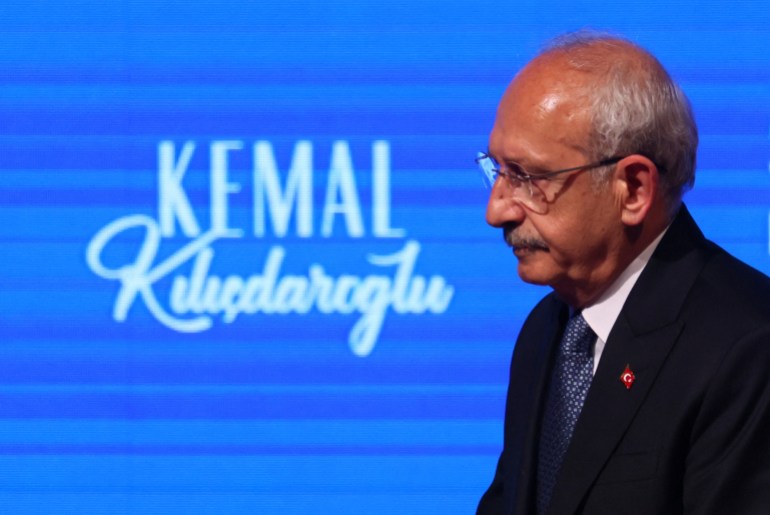Turkey’s election likely heading to run-off; Erdogan has the edge
Neither the president nor top opposition candidate Kilicdaroglu cleared the 50 percent threshold needed to avoid a second round on May 28.

Turkey is likely headed for a run-off after President Recep Tayyip Erdogan’s vote share dropped just under the 50 percent threshold needed to win with nearly all the votes counted while the opposition candidate Kemal Kilicdaroglu, who was projected by opinion polls to win, managed to garner 45 percent of the ballots.
Erdogan, 69, said he would respect the nation’s decision if the race went to a run-off scheduled for May 28. His main challenger in Sunday’s elections, 74-year-old Kilicdaroglu, admitted that a run-off seemed inevitable.
Keep reading
list of 3 itemsTurkey’s Erdogan, Kilicdaroglu end campaigning before election
Erdogan: The man who has dominated Turkish politics for 20 years
The incumbent, who faced the biggest challenge of his 20-year rule in these elections, said he could still win in the first round. He managed to get 49.4 percent of the votes with more than 99 percent of ballots counted.
“We don’t yet know if the elections ended in the first round. … If our nation has chosen for a second round, that is also welcome,” Erdogan said early on Monday, noting that votes from Turkish citizens living abroad still need to be tallied. He won 60 percent of the overseas vote in 2018.
“We are already ahead of our closest rival by 2.6 million votes,” Erdogan said in the capital, Ankara. “We expect this figure to increase with official results.”

‘Results confounding expectations’
Kilicdaroglu, speaking to reporters early on Monday, expressed confidence about a run-off.
“If our nation says second round, we will absolutely win in the second round,” he said. “The will for change in the society is higher than 50 percent.”
This year’s election largely centred on the economy, civil rights and February earthquakes that killed more than 50,000 people.
Sonar Cagaptay, a senior fellow of the Washington Institute, said the results were confounding expectations, including the rise of the third candidate in the race, “anti-refugee and anti-immigrant” Sinan Ogan.
“Erdogan pulling some 3 percentage points ahead or more, … that’s surprising,” he said from Ankara. “What is even more surprising was the emergence of the third poll candidate. He wasn’t a significant part of the vote, … but enough to be a spoiler.”
Cagaptay said both leading candidates will have to court 55-year-old Ogan to try to secure a win in the now likely second round and give him concessions.
Ogan was expelled from an ultranationalist party that has since joined forces with Erdogan. He entered the campaign a few months before the vote.
“We will not say if we will support this or that candidate,” Ogan said Sunday. “We will hold consultations with their representatives and then decide.”
Al Jazeera’s Zeina Khodr, reporting from the south-central city of Gaziantep, said the majority that Erdogan’s alliance won in the parliament gives him an advantage in the run-off.
“Even if the opposition wins in the run-off vote, it will be very hard for them to push through their promises, such as changing the system of governance to a parliamentary system from a presidential one,” she said.
Khodr said opposition supporters had expressed disappointment with the results.
“There are members of the opposition who are disappointed because they felt that Kilicdaroglu was the wrong candidate as he was not able to reach out and chip away the conservative votes from the party,” she said.

Vote-counting process
Turkey’s election authority, the Supreme Electoral Board, said it was providing numbers to competing political parties “instantly” and would make the results public once the count was completed and finalised. The unofficial counts are based on the state-run news agency Anadolu.
The majority of ballots from the 3.4 million eligible overseas voters still needed to be tallied, according to the board. It added that a May 28 run-off was not assured.
With 93 percent of the votes counted, the People’s Alliance, led by Erdogan’s Justice and Development Party (AK Party), was on course to win 324 seats in the 600-seat parliament. Kilicdaroglu’s Nation Alliance, consisting of six opposition parties, including his secularist Republican People’s Party (CHP), looked set to take 211 seats.
Erdogan has governed Turkey as either prime minister or president since 2003.
As the preliminary results started to trickle in on Sunday evening, the rival sides traded accusations with Kilicdaroglu claiming his rivals were “blocking” the ballot counting while the ruling AK Party spokesman Omer Celik said the CHP was guilty of sabotage.